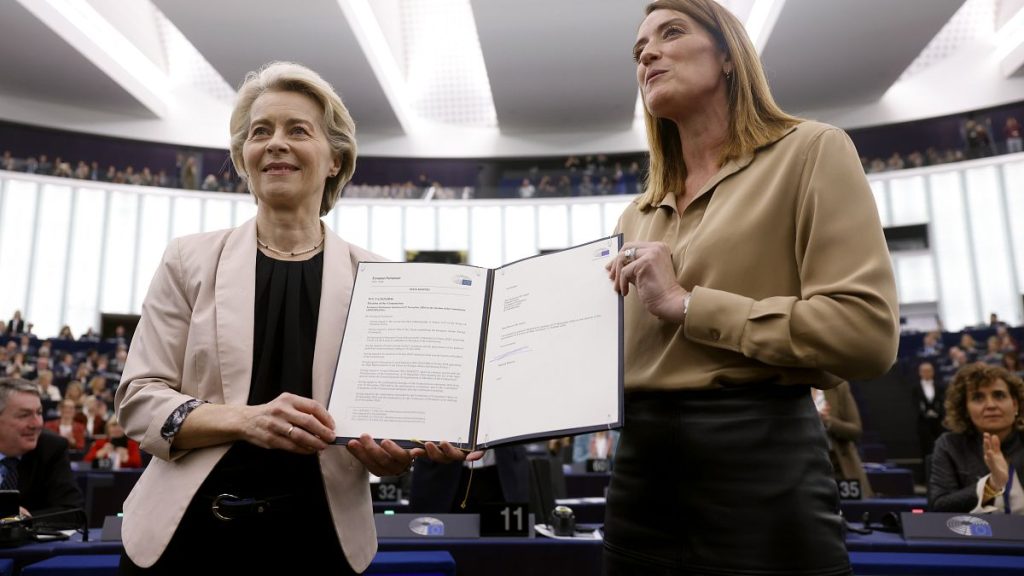2024: A Year of Upheaval and Transformation in the European Parliament
The year 2024 witnessed a significant shift in the European Parliament’s landscape, shaped by the July elections and punctuated by dramatic events both within and outside its walls. From farmer protests to poignant speeches, contentious legislative battles, and a reshuffling of political alliances, the Parliament navigated a turbulent year that redefined its composition and priorities. This period underscored the complex interplay of internal politics, external pressures, and the ongoing struggle to define the EU’s role in a rapidly changing world.
The year began with a dramatic display of discontent as farmers from across Europe converged on Brussels to protest EU trade and environmental policies. The demonstration, involving a tractor procession and occupation of the square in front of the Parliament, highlighted the growing tensions between agricultural interests and the EU’s environmental agenda. This set the stage for a year of intense debate surrounding issues of sustainability, food security, and the economic impact of EU regulations. The farmers’ actions served as a stark reminder of the real-world consequences of policy decisions made within the Parliament’s chambers.
February brought a poignant moment of unity and reflection as Yulia Navalnaya addressed the Parliament following the suspicious death of her husband, Russian opposition leader Alexei Navalny. Her powerful speech, condemning Vladimir Putin and urging the EU to adopt innovative strategies to counter his influence, resonated deeply with MEPs. Navalnaya’s call for a bolder, less conventional approach to confronting authoritarianism underscored the growing concern within the EU about Russia’s actions and the need for a more assertive response. This event served as a reminder of the human cost of political repression and the importance of upholding democratic values.
The latter part of the year was dominated by the contentious debate surrounding the Nature Restoration Law. The European People’s Party (EPP) launched a vigorous campaign against the proposal, arguing that it would harm food production and livelihoods. This sparked a fierce debate between the EPP, right-wing groups, and those who championed the law as essential for environmental protection and economic sustainability. The eventual passage of a watered-down version of the law highlighted the challenges of balancing competing interests and the complexities of enacting ambitious environmental legislation.
April saw the culmination of a long-fought battle over the EU’s migration and asylum policy. After nearly four years of negotiations, the Parliament approved the "Pact on migration and asylum," a comprehensive reform package aimed at streamlining procedures and sharing the responsibility of welcoming asylum seekers. The pact, supported by the major parliamentary groups but opposed by right-wing, Green, and Left parties, introduced stricter border controls and faster repatriation processes alongside a solidarity mechanism for burden-sharing. This landmark legislation reflected the EU’s ongoing struggle to address the complexities of migration and find a balance between humanitarian concerns and security considerations.
Beyond major legislative battles, the Parliament also grappled with symbolic yet divisive issues, such as the right to abortion. A resolution to include abortion in the EU Charter of Fundamental Rights sparked heated debate and highlighted the deep divisions within the Parliament on this sensitive topic. While the resolution passed, its non-binding nature and the exclusive competence of member states on healthcare matters underscored the limitations of the Parliament’s influence on certain issues. This episode demonstrated the Parliament’s role as a forum for expressing diverse viewpoints, even on matters where its power to enact change is limited.
The final months leading up to the European elections saw a flurry of legislative activity, with the Parliament rushing to approve a range of important measures, including the right-to-repair directive, a ban on products made with forced labor, and new rules for digital platform workers. This legislative sprint reflected the Parliament’s desire to finalize key initiatives before the elections and leave its mark on the EU’s policy landscape. These last-minute efforts highlighted the dynamic nature of the legislative process and the importance of timing in shaping the EU’s agenda.
The post-election period revealed a shift in the Parliament’s political dynamics. The emergence of the so-called "Venezuela majority," an alliance of center-right, right-wing, and far-right groups, signaled a potential realignment of forces and a stronger conservative influence. This new alliance’s support for Venezuelan opposition figures and their subsequent award of the Sakharov Prize for Freedom of Thought indicated a growing focus on human rights and democracy promotion in Latin America.
October witnessed a dramatic showdown between European Commission President Ursula von der Leyen and Hungarian Prime Minister Viktor Orbán. Their fiery exchange, centered on the war in Ukraine and Hungary’s relationship with Russia, exposed the deep divisions within the EU over its response to the conflict. Von der Leyen’s pointed criticism of Orbán without naming him highlighted the tension between the Commission and member states that challenge the EU’s common stance.
The final approval of von der Leyen’s College of Commissioners in November, albeit by a slim margin, revealed the fragility of her support within the Parliament. Defections from several major political groups underscored the challenges she faced in building a strong and stable coalition. This narrow victory suggested a more fragmented and potentially less predictable Parliament in the years to come.
Throughout the year, the Parliament also experienced its share of lighter moments, from barking dogs to football-related insults and symbolic gestures of peace. These quirky occurrences, while seemingly trivial, offered a glimpse into the human side of the European Parliament and the diverse personalities that populate its halls.
In conclusion, 2024 was a year of significant change and upheaval for the European Parliament. From farmer protests and impassioned speeches to legislative battles and shifting political alliances, the year witnessed a redefining of the Parliament’s composition and priorities. These events underscored the complex interplay of internal politics, external pressures, and the ongoing struggle to define the EU’s role in a world facing increasing challenges.

